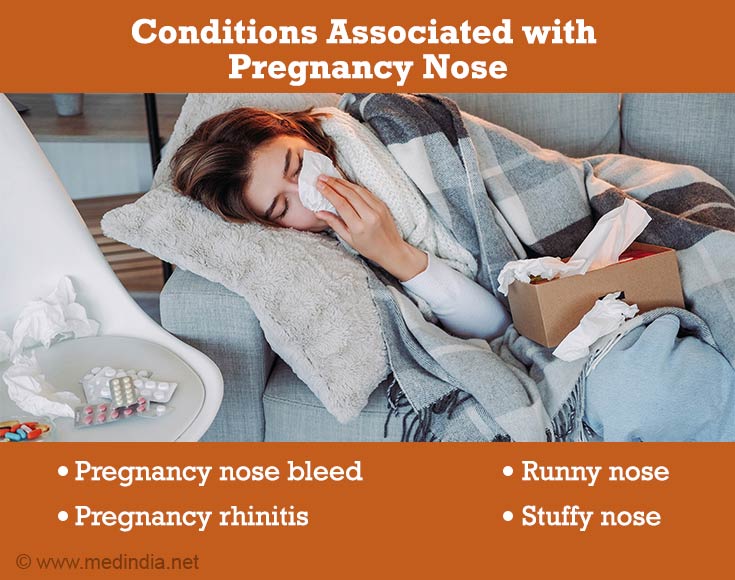- Estrogen-Induced Uterine Vasodilation in Pregnancy and Preeclampsia - (https://www.ncbi.nlm.nih.gov/pmc/articles/PMC8772435/)
- Efficacy and Safety of Fluticasone Furoate and Oxymetazoline Nasal Spray: A Novel First Fixed Dose Combination for the Management of Allergic Rhinitis with Nasal Congestion - (https://pubmed.ncbi.nlm.nih.gov/35712651/)
Introduction
Many women have recently gone to social media to publish images, pregnancy nose tiktoks, and videos of their noses before and during pregnancy. The 'pregnancy nose' craze has highlighted how some women's noses enlarge and alter form during pregnancy. It is unclear how often this happens because everyone's hormone levels vary and everyone reacts differently to changes in them. Some women may notice the difference more than others.
Changes in a woman's body are unavoidable during pregnancy. It's easy to overlook these changes, which range from your breasts becoming larger, heavier, and more painful to peeing more frequently. But did you know that the nose can sometimes become obstructed during pregnancy?
That is something expectant women have been discussing on social media! Many people have shared pregnancy nose videos that illustrate the before and after shape! Their 'after pregnancy' photos reveal larger noses. This is everything you need to know about the pregnant nose fad.
You may have heard of pregnant rhinitis, which also affects the nose. You must deal with a stuffy nose in this scenario. Another alteration in the body during pregnancy that ladies can't get enough of is the pregnant nose. Dr. Rana Choudhary, gynecologist at Apollo Spectra Mumbai, was asked about the pregnancy nose by Health Shots.
The list of changes in the body during pregnancy is extensive. However, pregnant mothers' initial thought is whether a certain change is normal or not. You may even question whether your baby's motions are normal (typical baby movements during pregnancy).
What is a Pregnancy Nose?
Pregnancy nose is when your nose appears to be growing larger, specifically during pregnancy.
According to Dr. Choudhary, a woman's body undergoes changes from the first to the third trimester that persist throughout the postpartum period. Furthermore, most of the changes are typical, such as your nose growing larger during pregnancy.
What Causes Pregnancy Nose?
According to the expert, blood vessels tend to widen to accommodate the growing fetus beginning in the first and second trimesters. Increased blood flow into your mucous membrane directly behind your nose might be caused by estrogen levels in your body. Because of the increased blood flow, the muscles and membranes in your nose expand.

As a result, the size of your nose will grow. During the third or last trimester, some women experience water retention in their faces, which leads to swelling of the nose(1✔ ✔Trusted Source
Estrogen-Induced Uterine Vasodilation in Pregnancy and Preeclampsia
Go to source).
Pregnancy Nose is Uncommon
Not every pregnant woman will have a larger nose. Only a subset of women may be affected. According to Dr. Choudhary, some women may notice that the color of their noses changes to red. This is related to fluctuating hormone levels, which affect skin color.
These symptoms generally affect One out of every Five pregnant women.
Is Pregnancy Nose the Only Complication of Pregnancy?
The pregnancy nose isn't the only strange transformation your body may go through when pregnant.
Certain changes are anticipated when a woman becomes pregnant. It could be unusual food cravings, a ‘glowing’ complexion, or morning sickness.
However, some of the changes that the body goes through during pregnancy are a little more unusual.
Pregnancy Nose Bleed
Because of hormonal changes, nosebleeds are extremely prevalent during pregnancy. They can be alarming, but as long as you don't lose a lot of blood, there's nothing to worry about, and they can typically be treated at home. Blood spills from one or both nostrils during a nosebleed.
Pregnancy Nose Bleed in the Third Trimester
During pregnancy, especially in the third trimester, your body produces a lot more blood. The tiny blood vessels in your nose might expand, dry out, and rupture, causing you to bleed, a condition known as epistaxis.
Pregnancy Rhinitis
Pregnancy Rhinitis is an inflammation of the nasal mucous membranes. This results in nasal congestion. Increased blood flow to the nasal passageways and nasal vein expansion also play a role.
Pregnancy rhinitis symptoms develop throughout pregnancy. In addition to feeling uneasy, your sleep may be disturbed. This is because lying down worsens the congestion. This may cause you to feel weary throughout the day. Long-term pregnancy-related nose congestion might potentially cause difficulties. Sinusitis and ear infections are examples of these.
When Seeking Pregnancy Rhinitis Treatment, Exercise Caution
To open up their nasal passages, many women use non-prescription, over-the-counter (OTC) decongestant sprays. These medications will not help with pregnancy-related rhinitis. These medications may provide you with brief relief. However, they may aggravate your symptoms and cause a full nasal blockage(2✔ ✔Trusted Source
Efficacy and Safety of Fluticasone Furoate and Oxymetazoline Nasal Spray: A Novel First Fixed Dose Combination for the Management of Allergic Rhinitis with Nasal Congestion
Go to source).
How can you get Pregnancy Rhinitis Under Control?
Experts advise you to rest comfortably with the following measures:
- Do not take over-the-counter nasal decongestants.
- Drink plenty of water.
- Increase the humidity in your house. Use a humidifier.
- Avoid nasal irritants like cigarette smoke.
- Get your feet moving. Regular moderate-intensity exercise can help alleviate congestion. It can also improve your sleep. But first, consult with your doctor to determine which workouts are appropriate for you.
- Raise the head of your bed before going to bed. Use an extra pillow or a wedge, for example.
- Consult your doctor about using over-the-counter nasal strips and saline nasal sprays or drops during pregnancy.
Pregnancy Nose: Not a Cause for Concern, just Transient
It happens because of the huge changes in hormone levels that occur during pregnancy, particularly the increase in estrogen, which relaxes the blood vessels in all tissues of the body.
This lets more blood into the tissues of the nose, allowing them to grow and change shape, making them appear larger and puffier.
These hormonal changes can also result in -
- Runny nose during pregnancy, especially in early pregnancy
- blocked nose during pregnancy
- Stuffy nose during pregnancy, especially in early pregnancy
- Nosebleeds, also popularly known as ‘bloody noses’, are common in the first and third trimesters.
- Nasal congestion during pregnancy
- Itchy eyes
- Post-nasal drip during pregnancy
Is Pregnancy Nose the Only Change in the Body?
However, a pregnancy nose isn't the only unusual transformation your body may go through while pregnant. Here are a few more:
Heart and Pregnancy
During pregnancy, the heart undergoes several modifications to suit the baby's growth.
The heart is pushed higher up in the chest as a result of the abdominal organs being squeezed and relocated to create a place for the growing fetus.
Not only that but during pregnancy, the heart produces bigger muscles and changes in size. This is because the heart has to work much harder during pregnancy, beating up to eight times faster per minute than before to pump the extra volume of blood across the body and to the baby.
In rare situations, a woman's blood circulation throughout her body doubles during pregnancy. This helps ensure there’s enough oxygen getting to the baby to support its development.
Skin Color Changes
We've all heard of the pregnant "glow," which causes some women's skin to appear brighter. However, some women get melasma, a disorder in which the skin around the eyes, nose, chin, and upper lip darkens.
It's a very common illness, affecting over 75% of pregnant women, but it's more common in women with darker skin. These modifications differ from woman to woman and usually disappear quickly after birth or when the woman stops breastfeeding.
The specific etiology of melasma during pregnancy is unknown, but it is assumed that increases in estrogen and progesterone are involved.
During pregnancy, the skin surrounding the nipple (known as the areola) might also darken. Again, it's unclear why this occurs, but it could be to assist newborn babies with identifying the nipple for eating.
Newborns can only see things that are very saturated and red, and they can't see much more than a foot away from their faces. They discern between light and dark considerably better; therefore, the contrast between the dark areola and the pale surrounding skin may aid them. Most women's areolas will likely remain slightly darker following pregnancy.
Hair Growth and Shedding
Because of the rise in estrogen in the body, which enables the hair follicles to remain in growth mode, many women's hair grows and appears healthier during pregnancy.
Regrettably, hormonal fluctuations affect all hair follicles, not just those on the head. This means that hair growth might occur in less ideal locations during pregnancy, such as the upper lip, upper thighs, abdomen, and back; however, this disappears after pregnancy.
During pregnancy, some women experience hair loss instead. This is usually caused by the shock of pregnancy on the body, which causes the hairs to go into a "resting" period and eventually shed. This normally goes away as the pregnancy goes on.
Hair loss can also occur after childbirth due to a decline in estrogen levels as hormones return to normal. Hair loss often peaks four months after birth. In most situations, the hair regrows and returns to normal.
Changes in Oral Health
Many changes in dental health can occur during pregnancy.
Estrogen and progesterone surges might make the gums more prone to bleeding, infection, and injury. Gingivitis affects around 70% of pregnant women. Teeth are also more vulnerable to damage and cavities during pregnancy, especially if a woman has morning sickness. This is because stomach acid can damage the protective layer of teeth.
During pregnancy, teeth may also feel shaky. This is due to an increase in estrogen levels as well as an increase in a hormone called relaxin. During pregnancy, it stimulates all ligaments in the body to become more flexible to aid in birth. While this is beneficial in some areas of the body (such as the pelvis), relaxin also affects the ligament that holds each tooth in place, resulting in the tooth feeling loose.
Tooth loss is more likely to occur in women who have had many pregnancies and in women from lower socioeconomic backgrounds. If a woman loses any teeth during pregnancy, it is usually due to years of poor oral health, not just the changes that occur during pregnancy.
While some of the changes you'll go through during pregnancy aren't ideal, they're all intended to help the baby develop properly in the womb. Fortunately, most of these abnormalities are transient, fading shortly after birth.









